Welcome to my new blog which reflects some of my thoughts and discoveries whilst completing my first book, through publication, and beyond:
‘Guernsey Evacuees: The Forgotten Evacuees of the Second World War’
MY AMAZON AUTHORS PAGE LISTS ALL MY PUBLICATIONS – CLICK HERE
https://www.amazon.co.uk/Gillian-Mawson/e/B008MWQ0IE/ref=dp_byline_cont_book_1
Monday 16 Jan. 2012
Today I am reading newsletters written by Channel Island people who had emigrated to Canada before WW2. During WW2 they raised funds for the Guernsey evacuees in England. They worked so very hard to send money and clothes to the evacuee children and later to the Guernsey people who were deported to Germany. Very inspiring!
Wednesday 18 January 2012
For the past two days I have been reading diaries written by Guernsey teachers who led their evacuated schools over to England. The dedication that they showed to their pupils was amazing. The teachers who re established their schools in England not only taught the children but took responsibility for their accommodation, health and welfare, and their careers when they left school at the age of 14. They could not contact the children’s parents who were trapped in occupied Guernsey, so had many decisions to make on behalf of the children. May have to dedicate a whole chapter of my book to one of these schools as that particular diary is so detailed!
Friday 20 January 2012
For the next 3 days I am reading archive material about an elderly Manchester gentleman who raised thousands of pounds in order that 300 of the Channel Island children could have a Christmas parcel each year. He was 72 when he began his fundraising, and for 5 years he obtained donations from all over the world! I managed to locate his grandson and we had a lovely meeting. My aim is to tie his memories of his Grandfather to the archive documents, to obtain the full story of Mr Fletcher’s remarkable achievements, for my book and for the local press.
Monday 23 January 2012
Have been reading personal stories today from evacuees whose pets were put to sleep just prior to the evacuation. Very upsetting but it will have to be included in my book. Some husbands decided not to evacuate, partly to look after their property but also to avoid having to have their working horses put to sleep. Back to writing my book now whilst I am feeling inspired! More in a day or two.
Wednesday 25 January 2012
This week I have begun to read the unpublished personal diary of a Guernsey Mother who was evacuated to Cheshire. She also pasted lots of other items into her diary during the war; handmade Christmas cards that she received, cinema tickets, poems, sketches, theatre brochures and photographs. It really gives an insight into her life as an evacuee during the war. She also includes a number of newspaper cuttings about the progress of the war. What a treasure trove this is!
Saturday 28 January 2012
Just transcribed the most amazing interview with a Guernsey lady. She left the island at the age of 16, and whilst she was in England, she built Wellington bombers, became one of the first female engine fitters in the WAAF, then undertook Top Secret work on ‘Operation Overlord’ on the lead up to D Day. What a lady! This is definitely going into my book in the ‘British War work’ section!
Tuesday 31 January 2012
Have spent the last day or so reading wartime diaries/letters of Guernsey women who were offered houses, shops and flats in England that were unfit for human habitation. They also were sexually discriminated against – local officials wouldnt allow them, as women with husbands trapped in Guernsey, to rent properties. Only women whose husbands were in the Forces could rent property. How they coped for 5 years in England, I will never know. I have met several of them recently, they are all in their mid to late 90s, and they are wonderful ladies!! It will be an honour to record their words in my book.
Thursday 2 February 2012
Just re reading my interview with a family that evacuated from Guernsey to Lancashire in 1940. The husband and wife were given a house that was in a terrible state. During air raids, they would go into the cellar where they both stood, knee deep in water, for hours on end, passing their baby to and from each other to keep her dry.
4 February 2012
I have been looking through the Red Cross letters that were sent between England and Guernsey during the war. They were the evacuees’ only form of contact with their families in German occupied Guernsey for five years. The letters were censored by German authorities in Europe during transit. The first letters, sent from England in November 1940, could only contain 10 words, but this was increased later to 25 words. It was so hard for people to put their thoughts and feelings into such a short message to their family.
7 February 2012
I have just discovered a Manchester press cutting dated March 1941 which explains the delight of the Guernsey evacuees in the Manchester area as replies began to arrive to the messages they had sent to Guernsey in November 1940. One lady who was evacuated to Stockport told me that she remembers crying as she opened the envelope, to discover that her husband and son were fine and well, but that her aunt had passed away.
9 February 2012
In June 1940, Harry Kinley was Second Officer on the SS Viking which carried thousands of Guernsey children to England. He later wrote his memories of the journey. I have also been in touch with Audrey Mansell, daughter of the Viking’s Captain James Bridson, who has written a piece in the Dorset Echo:-
Do let me know if you recognise any of the evacuee children, pictured with Captain Bridson, in the photograph below:-
13 February 2012
I worked with a Guernsey evacuee, John Searson, to rediscover lost footage of Channel Islanders taken by Pathe News in England during the war – at Belle Vue, Manchester, in 1945. We broke the story to BBC Channel Islands television and a feature appeared on the local news, together with the lost footage. The news clip can be watched here:
http://www.bbc.co.uk/news/world-europe-jersey-15960347
16 February 2012
Today I have been reading and writing about Guernsey’s Forest School which evacuated to Stockport, then to Cheadle Hulme. The school was re established there for 5 years until the end of the war. The evacuees arrived at Stockport railway station at 5am on a wet morning, and were taken to the Masonic Guildhall where they remained for around two weeks. A surviving Headmaster’s diary says that his staff and pupils were very well cared for by the ladies of the WRVS and the other volunteeers. He also mentions that the people of Stockport sent gifts of books and toys to the evacuee children. (Guildhall photograph to follow soon)
20 and 21 February 2011
I spoke to an evacuee the other day whose family left London in February 1940 in order to escape the war; the father set up a farm in Guernsey and things seemed to be going really well. Then in June 1940, as the threat of German invasion grew, the family had to evacuate back to England once more.
I read a sad entry in Guernsey Headmaster Mr Martel’s diary today, which he wrote a few months after his Guernsey school was re established in Cheshire. Photographers were touring around all the schools offering to take photographs of evacuated children, probably quite a lucrative business in late 1940.
A photographer came to Mr Martel’s school offering ‘To take photos of your pupils, to give the mums and dads a look at how their kiddies are doing’. Of course this photographer did not realise that the children had come from Guernsey and that most of them could not communicate with their families there. He was soon advised of their unique situation. Mr Martel sadly wrote in his diary that evening, “What would our children give to be able to send their photographs to Mother and Father?’
24 February 2012
I had a meeting yesterday with 12 of my evacuees and we had a great time. I listened to them share their wartime memories, and during this time, some discovered that they had distant relatives, or were reminded of things that they had forgotten. I also discovered today that our group has been shortlisted for a Community Award through the Manchester Histories Festival, for the event that we held in Stockport in October last year. This is a real honour. You can watch a BBC News report about our Stockport event at this link to see what we all got up to on the day:
http://www.bbc.co.uk/news/world-europe-guernsey-15536660
You can find out more about the wonderful Manchester Histories Festival at: (We are there on Sat 3 March, 1-2pm in the Town Hall)
http://www.manchesterhistoriesfestival.org.uk/getinvolved/community-history-awards
27 February 2012
Have spent the day reading through stories of Guernsey people who undertook war work, they joined the forces, the Home Guard, the ARP, made ammunition in factories, and joined the Fire Brigade, the list is endless. Children played their part too, packing Red Cross parcels and collecting salvage. One Guernsey school grew 6 pounds of tomatoes and contributed them as a raffle prize for War Weapons Week! This subject needs a chapter of its own in my book, but I can only spare it a few pages. Today I also chose the image for the front cover of my book, and a draft title – I will see a mock up of the cover in a few days time, very very exciting!
4 March 2012
I have spent most of the past few days involved in the Manchester Histories Festival. On Friday our Guernsey Evacuee group was awarded a Highly Commenced Community Award – we are all so very pleased (more information in my 24 Feb entry above). On Saturday, myself and two Guernsey evacuee sisters Hazel and Mavis met visitors at Manchester Town Hall. I have also just received the design for the front page of my book, and here it is:
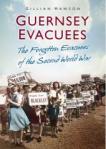
12 March 2010
I have spent the last week or so sifting through the poems, letters and songs that were written by Guernsey evacuees in England during the war. Several will appear in my book and I thought I would show you this one which was written by a Guernsey girl called Barbara Ozanne. I want to draw your attention to the words of the person running the competition:-
‘I am afraid, children, that very few of you are poets judging by the entries you sent in’
I feel sure that, today, such a comment would not be directed at children.
16 March 2012
I have been reading accounts of mothers who were evacuated on separate ships to their children, and spent weeks trying to find each other in England. One five year old boy was seriously ill in hospital and the press launched a campaign to find out if his Mother had managed to get to England from Guernsey. She was in Southampton and read the newspaper report, the newspaper paid for her train fare and she was once again reunited with her son, who recovered from his illness. There will be more about this in my book.
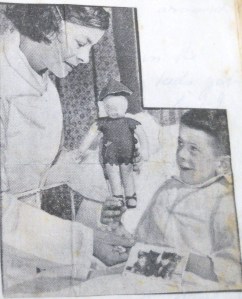
4 April 2012
There is a huge time gap in this blog as I had to complete my book chapters and submit them to The History Press by 31 March. Then I took a day or two to wind down! I really hope people like the book, I was quite emotional writing it, as the stories of the 200 or so people who shared their experiences with me, are extraordinary and often very emotional. The stories of the mothers who left Guernsey with their babies, leaving their husbands behind, are amazing, and I am so lucky to have been able to meet them, as they are in their mid nineties. They have amazing memories of the war years though and some fabulous photographs which I have included in my book (102 images in total). I have used the evacuees’ own words throughout the book which I hope will connect with people and bring the whole story to life. will continue to write this blog up to 1 November when the book is released, as I am sure there will be some changes to the text between now and then.
10 April 2012
During my research for this book I discovered that during the war, one of the Guernsey schools which was re-established in England – La Chaumiere School in Cheshire – was sponsored by the Foster Parent Plan organisation. I find this sponsorship story fascinating and have written part of a chapter about it in my book. The main focus is on Eleanor Roosevelt’s sponsorship of a Guernsey girl in the school, but other pupils were sponsored by American Senators, High Schools and naval officers. They were all so thankful to receive letters from people, as communication between Guernsey and England during the war was practically non existent but for rare 25 word Red Cross letters. Some children also received gift parcels from America.
I was also fortunate enough to contact the daughter of Eric Muggeridge – Eric and a friend set up the Foster Parent Plan scheme which supported La Chaumiere – and I was given access to Muggeridge family documents. This gave me a real insight into the idea behind the Foster Parent Plan’s inception and aims. My book comes out in November but I now understand a few copies have already been ordered via Amazon.co.uk which is good news! (I understand it will be avaialble via Amazon.com in October)
15 April 2012
The story of Mr John Fletcher, the Bury man who raised funds for Christmas gifts for the Channel Island evacuee children, is still turning up new information. I recently discovered that Henry J Allen, an ex-Governor of Kansas, USA, raised money and send it to Mr Fletcher to help the Guernsey evacuee children in England. I have now written a piece for the Kansas Historical Society’s website which can be viewed here: http://www.kshs.org/kansapedia/henry-j-allen-guernsey-evacuees/17600
18 April 2012
I have been re reading the evacuee children’s first impressions of England in June 1940. They were amazed by the difference between their rural island and the industrial appearance of English towns: the wide roads, buses and trams, steam trains and viaducts, and many were shocked by the soot coating the buildings. One boy recalls his first sight of Stockport – see picture below.
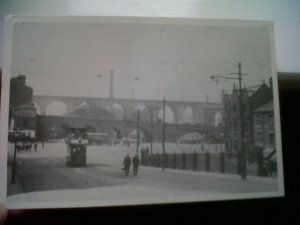
1 May 2012
I have been thinking over the past week or two about the information that I will NOT be able to include in my book. Having interviewed nearly 200 evacuees who have shared their memories, personal documents and photographs with me, I have so much information that it simply will not fit into a book of 60,000 words. It has been extremely difficult to choose the memories that are going into this book, and to leave so many out. I will ensure that all the stories given to me are shared with the public through this blog, school talks, magazine articles and our community events so that the stories given to me will not remain untold. Some of the evacuees who shared their wartime stories with me have since passed away and, during our interviews, they really wanted their stories to be heard. I will not let them down.
7 May 2012
On May 9 1945, the Channel Islands were liberated and the evacuees could at last prepare for the return home to their own island. I have been to Guernsey several times to celebrate Liberation Day there. However, it is always a joy to know that St Marys Church in Disley, Cheshire, flies the Guernsey flag for a week around Liberation Day every year, in memory of the many Guernsey evacuees who lived in the village between 1940 and 1945. After the war, the villagers were presented with a large copper Guernsey milk can which sits in pride of place in the Church to this day. Here is a photograph of the Guernsey can inside St Marys – the inscription reads ‘To The People of Disley – from the Guernsey Evacuees, 1940-1945’
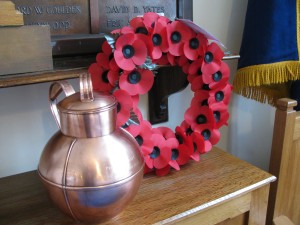
10 May 2012
Yesterday was Guernsey’s Liberation Day, and I celebrated the event by visiting a Guernsey friend during the afternoon. As I entered her home, waving my Guernsey flag, I was confronted by a huge but rather threadbare Union Jack which she had placed over an internal door. The flag has a story!
On 30 June 1940, when the Germans invaded Guernsey, her family hid the flag and for five years it was kept out of sight. On 9 May 1945, the day that British forces arrived to liberate the island, the flag was brought out, unfurled and hung out to greet the British forces. Since then, and despite the poor condition of the flag, it is brought out for just one day each year, 9th May, to mark Liberation Day. Although it is full of holes and very fragile, it stands testament to a turbulent time in the history of Guernsey. I felt that I had to photograph the flag as best I could, so here it is:
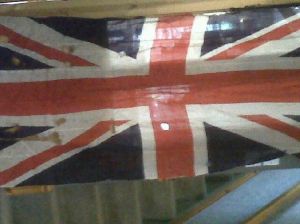
16 May 2012
Recently I have been reading a number of letters and postcards that were sent by Guernsey parents to their children in England in May 1945. Special Liberation Postcards and letterheads were designed and many still survive to this day. I thought I would also show you this postcard that was printed just after Liberation, which shows the Nazis being kicked out of Guernsey by a Donkey. This is because born and bred Guernsey men are generally refered to as ‘Donkeys’ – for an explanation as to why, click on http://www.thisisguernsey.com/community/history-heritage/guernsey-donkeys/
When the evacuees had settled a little in England and Scotland, they formed around 90 ‘Channel Island Societies’ where they could meet up, talk about their families, and help each other during their five year exile from the Channel Islands. There is more about the work of these societies in my book, but here is a photograph of the Bury Channel Island Society Committee – which was based in Lancashire, England.
23 May 2012
The photograph below shows Brian with his teddy bear – he was only 6 months old when his Mother brought him to England on the evacuation ship from Guernsey. Brian’s father joined the British Forces. Brian no memory of the evacuation, but his Mum, Violet, has shared the family story with me. She is the oldest evacuee that I have interviewed so far – being 99 years old. It was a fascinating interview for me and segments of her story feature in my book.
Brian married a local girl and lives in England. He is a member of my Guernsey Evacuee Community Group, and takes part in our various events.
4 June 2012
Recently discovered the diary of a young woman who evacuated with one of the Guernsey schools as a ‘helper’ to the teachers. She ended up in Cheshire, and wrote a diary throughout the war. It contains the birthday cards that were sent to her in England during the war, and the Red Cross letters that arrived from her family in Guernsey. Below is a birthday card that was made for her by a friend – and attached to the card was a reel of silk thread to be used to repair her stockings. It must have come in really useful at the time!
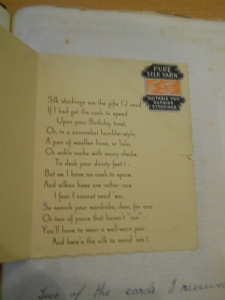
18 June 2012
I have spent the last few weeks interviewing more evacuees, and also writing an article about the Guernsey Evacuation for am American magazine called “Americans in WWII”, which should be published in the Autumn. I will make a note on this blog when it is available.
As the anniversary of the Guernsey Evacuation draws close once again, I am reading through diaries written by evacuees in June 1940, particularly in the days just prior to the evacuation. I will send out some of these snippets via Twitter and of course many are contained in my forthcoming book. One Guernsey woman had spoken to her sister a few days before the evacuation, saying “if the schools are actually evacuated, I am going to England with my pupils, will you come too and help me?”
On 18 June 1940, the President of the Education Council invited Guernsey Head Teachers to an emergency meeting, to inform them that the evacuation of school children was a possibility. That same evening, the sound of guns and explosions on the French coast could be heard in Guernsey, causing some alarm.
On 19 June 1940, the Guernsey newspaper announced that on 20 June, the evacuation of school children to England would commence. The children were to leave with their teachers, accompanied by around 500 women who would travel as ‘teacher’s helpers’. You can read the 1940 diary of a Guernsey evacuee mother on my ‘Diary of an Evacuee’ page on this website.
22 June 2012
During the last few days I have discovered more new information about the Evacuation, and feel that this research could continue for several years!! My focus recently has been on the Guernsey Mothers who evacuated to Northern England and I discovered a letter in an archive, which was written by such a mother. Her daughter and nephew had been evacuated to England before her, and the 3 of them were reunited after 6 months. The Guernsey mother wrote to the Billeting Officer, thanking her for her help in reuniting the family. She also included the following comments regarding the two separate English families that had cared for her daughter and her nephew:
“The lady who cared for my nephew was a real mother to him, she was kindness itself. However, my daughter was not at all happy with the lady who looked after her. She would not even allow the child to write to us. However the lady wrote to me to ask for money to look after my daughter, despite the fact that she was receiving a billeting allowance. She asked me, who had left everything I possessed behind in Guernsey, for money!”
I have also conducted some new interviews with evacuees this week. One boy left on an evacuation ship today in 1940 upon his 8th birthday. Another girl left on the same ship and it was her 7th birthday. They met up in Guernsey 13 years later and were married and of course share the same birthday. It wont be difficult for me to remember to send them their birthday cards!!
25 June 2012
At this time in 1940, evacuees were still leaving Guernsey, and some mothers, brothers and sisters told me that they became separated when they reached England, in the confusion. Others lost their few bits of luggage. The evacuees boarded steam trains, and thousands were sent to industrial areas such as Bolton, Stockport and Bury. There they were housed in evacuee reception centres created in public buildings such as churches, town halls and even dance halls. See my ‘Diary of an Evacuee Page’ for more information.
28 June 2012
Today, 72 years ago, evacuees were still fleeing Guernsey. However, around 6.30pm,this came to an abrupt end, when 3 German aircraft bombed the harbour at St Peter Port. They dropped bombs on the pier and town, then swooped down to machine gun the streets around the harbour, apparently assuming that the tomato lorries lined up at the harbour contained ammunition. Most of the lorry drivers had crawled underneath their vehicles for shelter, and when the lorries were hit, they were trapped underneath. The Isle of Sark mailboat was taking evacuees on board at the time, and its Lewis gun was the only defence the island had. When news of the air raid reached England, no further ships sailed for Guernsey, and the evacuation was effectively over. Thousands of Guernsey families were now separated from their loved ones. And Germany occupied the island on 30th June.
3 July 2012
This week I have been put in mind of all the evacuees that I have interviewed over the past four years for my book. Several have passed away over the past 12 months, or are now unable to leave their homes. One of the evacuees in my community group, Hazel, is in hospital just now, having hurt her back 5 weeks ago. I visited her in hospital a couple of days ago and we had a wonderful chat. Below is a photograph of Hazewl (seated on the right) with her sister Mavis, (seated centre of picture), which was taken at our community event in Stockport in October.
In June 1940 Hazel was evacuated from Guernsey to England with her schoolfriends and teachers, whilst Mavis left Guernsey with her mother. Their father joined the British forces. Hazel’s school was eventually sent to Alderley Edge in Cheshire, where her mother and sister eventually found her. It was not easy finding your children at that time, as record keeping of evacuee movements was incomplete.
After the war, the family decided not to return to Guernsey but to remain in England. Both Hazel and Mavis frequently take part in my community events so that they can share their evacuation experiences with people of all ages. Who knows, one day you may meet them!!
5 July 2012
Today in 1940, hundreds of Guernsey children and mothers were still living in an evacuee reception centre which had been created within Stockport Town Hall, Cheshire. The huge ballroom housed hundreds of camp beds, and the evacuees were assisted by local volunteers such as the WRVS and the Girl Guides. One Girl Guide recalls “We did what we could, nursing babies so that the mothers could have a break, some fresh air and a wash. We were very proud to be helping them, in our small way. Many seemed very distressed, and some of the younger children who had left their parents behind in Guernsey were crying for their Mums and Dads”. The image below shows some of these children in the entrance hall of Stockport Town Hall in June 1940.
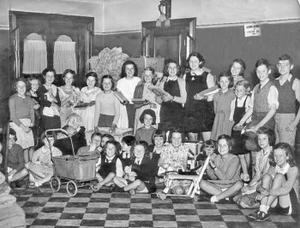
15 July 2012
Today I re-read the evacuation account of Margaret Le Poidevin who arrived in Stockport with her mother. As I read it, I was reminded of the plight of many of the mothers who, when they were released from the evacuee reception centres to find new homes, discovered that they were not allowed to rent property unless their husband was in the Forces. As a result, many of the Guernsey mothers whose husbands were trapped in occupied Guernsey shared houses with Guernsey mothers whose husbands were in the Forces. Mrs Le Poidevin and her children shared a home (an empty corner shop building) with Mrs Tippett and her children. Their home is shown below. You can find out more about this evacuee ‘homesharing’ in my ‘Diary of an Evacuee’ page.
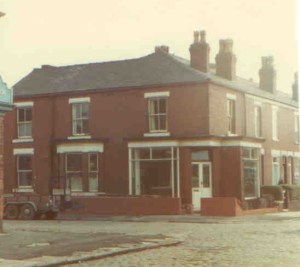
19 July 2012
Today I thought I would tell you about one evacuee who sadly I never got the chance to meet. Mr Lawson Allez’s daughter, Sandra, contacted me some time ago in order that I could meet her father to hear his evacuation story. Sadly, before we got the chance to meet, he was taken ill. Sadly, he passed away a few months ago but I promised Sandra that I would tell her father’s story.
Lawson was evacuated to England with his parents and 4 brothers. They arrived in Manchester where people were very friendly to the family. Lawson recalled “everything seemed to noisy after living on a quiet island”. During the war, Lawson met his future wife, Jean, at the cinema, and when Guernsey was liberated from Nazi occupation in May 1945, Lawson and his family returned to Guernsey. However, Lawson soon returned to Manchester, as he had promised, and married Jean in January 1946. Below is a wonderful photograph of Lawson and Jean on their wedding day. I have also included a photograph of Sandra holding family photographs (taken by my friend Emily)
Today I re-read Michael Paul’s account of his evacuation to Oldham with the Guernsey Intermediate School. He remarked on the treats that the evacuee children received, as follows: “We were given certain privileges by the Oldham authorities; free cinema tickets once a week, free use of rowing boats on the lake in Alexandra Park, and most welcome of all, free swimming in the local baths – so different from our beloved beaches or open-air sea water pools, but nevertheless, very greatly appreciated.”
Below is a fabulous wartime photograph of Michael with his classmates in Oldham. He is on the back row at the extreme left, and he is still as handsome today!!!
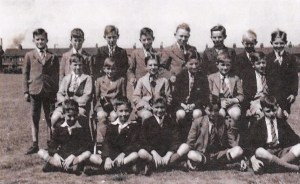
1 August 2012
Over the past months I have received a number of new evacuee stories which sadly cannot be fitted into my book. However, I plan to use them in many different ways, one being on this blog! I would like to share a little of Marlene Whittaker’s story with you today. Marlene was evacuated to England with her teachers and classmates. She recalled “I realised that I was going on my own, without my Mum and Dad, I felt sick in my stomach and my legs were shakey.” Marlene arrived in England and was sent to Glasgow where the evacuees slept in a church for a while. In the meantime, Marlene’s parents had left Guernsey on a cattle boat with their 2 other daughters. “They arrived in Yorkshire, expecting to see me there, and were very upset. My father put an advert in the district newspaper for ‘Missing Child'” Luckily a local lady saw it and helped to trace Marlene in Glasgow. Soon after, Marlene boarded a train, “I watched as Glasgow faded in the distance. We arrived at a little railway station in Yorkshire and there was my Dad. I remember grabbing his hand for dear life.” Below is a wonderful photograph of Marlene with her father.
6 August 2012
I was delighted to find out the other day that the documentary film I made with Diane Rickerby of Bury Archive Service on ‘Channel Island Evacuees in Bury, ‘All my Worldly Possessions’ is going to be screened at Guernsey’s ‘Sarnia Shorts’ film festival in October. It has been shown to a number of audiences in England and once in Guernsey. It is wonderful to know that more Guernsey people will see our film. Further information on the ‘Sarnia Shorts’ festival can be found at http://sarniashorts.wordpress.com/
16 August 2012
I thought that today I would share with you the film which was taken when Sir Geoffrey Rowland, then the Bailiff of Guernsey, unveiled the Guernsey Evacuation Plaque in May 2010. His speech is very moving and personal because his parents were evacuated to Stockport in 1940. You can watch the clip at at http://www.youtube.com/watch?v=wg9LivvvAbk
I also want to share another evacuee story with you, that of Kenneth Cleal. Born in London in 1925, Kenneth was sent to Guernsey in 1939 because it was felt that he would be safer there than in London. He attended the Boys Grammar School which was evacuated to Oldham, Lancashire in June 1940. In 1942 he met the woman who would later become his wife, Alice Scowcroft. Ken later joined the Royal Navy and saw service in the Far East as a Sub Lieutenant. When Guernsey was liberated, the couple decided to make their home there, and were married there in 1948. They remained in Guernsey for the rest of their lives. My thanks to their daughter, Anne, for allowing me to share this family story with you.
The image below shows Ken in Navy uniform in 1945
18 August 2012
I have written an article about Evacuee Women, including Mothers, who are often ignored by historians – you can read this at:
http://www.historyworkshop.org.uk/the-forgotten-women-evacuees-of-the-second-world-war/
26 August 2012
I have lately heard some new Guernsey evacuation stories, two of which were so sad that I just cannot share them with you here. The damage that was done to families, not just children, but parents and grandparents, because of five years of family separation, just could not be undone in many cases. Luckily I hear joyful stories at times, to balance the traumatic issues. A number are still in touch with the families that they lived with in England during the war. Although most are now too frail to visit each other for holidays, they regularly write and telephone each other. Wonderful!
10 September 2012
My apologies for the delay in writing another blog post but I have been busy interviewing evacuees. The sad thing is, in many cases, that when the evacuee children returned home to Guernsey after the war, many could just not bond with their parents after 5 years apart. One man told me, with tears in his eyes “My dad was like a stranger to me, we never bonded, I had grown up so much that he didnt recognise me, and we hardly spoke.”
Another evacuee told me “When I had left Guernsey in 1940 I was 13, but when I returned I was 18, a young married woman with a new baby. My parents just didnt know how to relate to me”. The island had suffered under Nazi occupation, and many evacuee Mothers returned to find that their homes had been destroyed or looted during the German occupation. Some families decided to return to England as they felt that the prospects for themselves and their children would be better.
28 September 2012:
Have been offline quite a lot lately due to proof reading my book, adding in a few new sections, and working with History Press on book signing events and marketing the book. I have learnt a lot! During this time however I have collected several new evacuee stories. I was also given a copy of a newspaper that the RAF dropped on Guernsey during the Nazi occupation. I feel very lucky to have seen this.
I also read a great cutting from the Guernsey Star of 1956 when the children of Vale School (which was evacuated to England in 1940) had collected £40 for refugees in Europe. Interestingly, Guernsey children collected money to clothe European refugees in 1939 – and when the Guernsey children were evacuated to England, some of them actually received clothing that they themselves had paid for in 1939!
4 October 2012
ONE EVACUEE LOST, AND ONE EVACUEE FOUND:
This has been very mixed week for me emotionally. On the one hand, the efforts of my friends on Twitter together with the work of the Huddersfield Examine, reunited a Guernsey evacuee, Pamela, with her wartime friend in Huddersfield, Betty. On the other hand, I was informed that one of the first evacuees that I interviewed, Mr Stan Hicks, had passed away.
Stan left Guernsey with his mother and younger brother in the hold of a cargo boat, and they were initially sent to Glasgow. His older brother evacuated with his school. Their father joined the family later, and in 1941 the whole family moved to Stockport. His father became an ARP warden and Stan attended Hollywood School which he hated with a passion! They returned to Guernsey in 1945 to find that their home had been taken over during the occupation. Stan told me that he had happy memories of his time in Stockport – apart from school! After the war, he returned to Stockport 3 times to have a look round, and I was fortunate to see Stan and his brother Reg in May 2011 when I screened my evacuation film in Guernsey. Rest in peace Stan.
16 October 2012
I have not had the time to blog for several weeks due to final proof reading of the book, helping to organise book signings, and making every attempt to market the book via twitter, facebook and the internet. The thought of 1000 copies of my book appearing in early November and them remaining unsold fills me with horror! I wrote the book with the sole purpose of sharing this untold WW2 story with the general public. I am delighted with the book trailer that a good friend of mine made for me ; you can view it here:
(there is sound) http://youtu.be/YR0uXCBCFHc
Please feel free to share the trailer with friends, or via your own facebook pages, twitter feeds or websites. I would be very grateful!
Today I thought I would give you an example of how evacuated Guernsey families were separated during WW2. I have a ‘Burnley Express’ press cutting from Guernsey. This Guernsey family had been separated as follows: Mr Pike was working in Manchester, his son Herbert was a prisoner of war, having joined the British forces in 1939. Mrs Pike’s four year old son Barry had been born in Burnley, and daughters Hazel and Odette were evacuated with the Guernsey Ladies College to Derbyshire then Wales. Another daughter, Noella, had evacuated with her school to Cheshire, whilst another son, Ronald, was working on a farm in Cheshire. Another daughter, Monica, had escaped from Guernsey with other members of the family in a fishing boat after the Germans had occupied the island, and been reunited with her mother in Burnley. How delighted they must have been when they all returned to Guernsey, to live under one roof!
25 October 2012
I just received an email pointing out the fact that I did NOT include the link to my Youtube book trailer in my above post! do feel a fool! Now rectified, and thank you for letting me know, dear reader 🙂 I have spent the last week writing articles for a number of local newspapers – mentioning the book and talking about the experiences of Guernsey evacuees who were sent to those particular areas. I hope that the readers will find the articles of interest, and hopefully I will be contacted by readers who remember the evacuees from the war. Here again is the link to my book trailer, which has been viewed by 500 people so far! (there is sound) http://youtu.be/YR0uXCBCFHc
30 October 2012
I received a fantastic document the other day, a copy of a newspaper that was dropped on Guernsey during WW2 by the RAF, and was passed from person to person behind the backs of the German occupiers. It is dated September 1940, and articles in the newspaper include ‘German Front Line Battered’ ‘St Pauls in London saved from destruction’, and ‘The Sinking of the City of Benares by German UBoat – 77 children drowned’.
Another article that would have interested the Guernsey people is the one entitled ‘Escape from Guernsey – Eight reach Britain’ which described the daring escape of 8 Guernsey men who left under cover of darkness in a 20 foot boat, under the noses of the Germans. It stated ‘The London Press is headlining their adventures .. the escapees included Mr Fred Hockey, aged 47, a signalman employed by the harbour administration, and three of his sons who were tomato growers’
6 November 2012
Since my last posting, I received the very sad news that Mr Martel, who gave me access to his father’s wartime diaries, has passed away. I was planning to see him when I visit Guernsey on 16 November, so this was quite a blow. I cannot thank he and his family for allowing me read the diaries which have brought my chapter on the evacuated Forest School to life in my book.
I have spent the past week responding to an increasing number of emails asking about the actual content of my book. At the same time, a message was sent out on Amazon which shocked many people who had pre ordered it on line. The message said that the book would not be available until late December, which is incorrect. I had to respond to numerous emails and tweets to assure people that the book WILL be published on 12 November, and received soon after by those who have pre ordered it. All part of being a writer eh?! Now back to my book signing preparations!
13 November 2012
I have just received one copy of the book from my fabulous editor, Michelle Tilling, at History Press. Its hard to believe that I began this work four years ago and now hold a book in my hand! There is a great deal in the book, but at the same time, so much had to be left out. 60,000 words only scratch the surface of the story of these evacuees. I hope that the evacuees and the public enjoy the book. I now sit back to wait and see!
19 November 2012
BOOK LAUNCHES, AN EVACUEE LOST, AND AN UNEXPECTED TRIP TO JERSEY
The book launch and signing events in Guernsey went really well, and the stock sold out within 45 minutes at the Guernsey Press shop, and at the German Occupation Museum. Both have ordered more books which is wonderful news. My arrival in Guernsey on Thursday was delayed by fog over the island, with the result that our plane landed in Jersey!! I spent two hours in the departure lounge reading a book and playing Word Mole on my Blackberry! This meant that my interview with the Guernsey Press had to be postponed to the next morning.
The book signings were wonderful for another reason – they gave me the chance to be reunited with many of the evacuees that I have interviewed, and their families. Some were waiting for me as I arrived in the Guernsey Press shop.
Forty more friends came to a book launch event that was kindly arranged for me at the German Occupation Museum. However, there was sad news as I discovered that the lovely Bill Batiste, whose story features in my book, had passed away in October. His family came to inform me, so this was another very emotional moment. Sir Geoffrey Rowland then said a few words to the crowd, as did I, then I disgraced myself by bursting into tears. Consequently the first books that I signed had a tear or two upon their pages! Below are two photographs – the first taken in the Press Shop, the other at the Museum. Thank you to everyone who welcomed me during my visit to Guernsey!
26 November 2012
The book signing at the People’s History Museum in Manchester went well on Saturday, and people came along to buy a book and also to talk to the Guernsey evacuees from my community group. Some were evacuated to Bury, two to Stockport and one to Yorkshire. Today, I thought that I would include a photograph of the lovely Bill Batiste, who passed away recently. Here he is as a child evacuee in Cheshire. His mother’s story is in my book and neither of them will be forgotten. I have more interviews and correspondence ongoing with evacuees, and people are asking me ‘what is going to be in your next book?’ to which I reply ‘Please, let us see how this book is received, before we make any plans for more!!’
29 November 2012
As stated above, the book signing at Manchester’s People’s History Museum was really enjoyable. We met two new evacuees who had made a special journey that day. I was given yet more information on the Guernsey evacuee experience, to add to my growing archive. We also met the daughters and sons of evacuees who are no sadly longer with us. They had come along to buy the book and to chat to myself and the evacuees to discover ‘the wartime experience of a typical evacuee from Guernsey’. They soon discovered that there is no typical story – each is quite different and very interesting. We also had with us a new banner which we can use at our events and talks – it created quite a stir as it was not possible to miss it due to its size! Here is a photo of the banner with myself and some of the evacuees, and relatives of evacuees, on the day. It was taken by hilip Green, Secretary of the Guernsey Society – which is devoted to keeping the history of the island alive. You can find out more about the Guernsey Society here:-http://www.guernsey-society.org.uk/
6 December 2012
Today I have a few images for you – photographs of several of my evacuees taken this week as they receivied the book from me. (Maureem Dorrian, Irene Moss and John Tippett) The other image is a Liberation Postcard which was sent by a Guernsey family to a child evacuee in England in May 1945.
20 December 2012
Because of a few recent enquiries(due to publication of my book) I am including here a film link that I originally shared with you in February. I worked with a Guernsey evacuee, John Searson, to rediscover lost wartime footage of Channel Islanders filmed at Belle Vue, Manchester, by Pathe News during the war (1945) We broke the story to BBC Channel Islands television and a feature appeared on Channel Islands TV, together with the lost footage. The news clip can be watched here: do let me know if you recognise a Guernsey, Jersey or Alderney relative!
http://www.bbc.co.uk/news/world-europe-jersey-15960347
1 January 2013
A very happy new year to you all and a peaceful 2013. Today I was given a link to an outstanding and poignant piece of film which was made by an American who visited Guernsey, via France, in 1939. As he drove through France, war had not broken out, but as he was visiting Guernsey, war was declared. He filmed Guernsey men leaving to join the British Forces, and on his way back to America, came upon a ship which had been torpedoed. The ship’s crew managed to rescue some of the survivors. It is a very moving film, and if you have 20 minutes to spare, do watch it.
http://www.jfredmacdonald.com/thehistoryshoppe/Video/playGuernsey.htm
11 January 2013
I recently received a wonderful account of a Guernsey school’s evacuation, written by a Guernsey teacher – Edward Swann. The school, St Sampsons, was evacuated to Glasgow, and I want to share with you Edward’s account of the children being brought to the school gates by their parents, and the moment when the teachers and pupils boarded an evacuation ship:
“We wore what extra clothing we could, tried to eat, took the important documents like birth certificates. We locked the doors and threw the keys up to Walt and Lena (our neighbours). It would be five years before we saw them again. One sound as we walked up Delancey – the quiet sound of many footsteps, children hand in hand with their parents, through all the little lanes leading to one focal point – the little hut by the school gate. Only the children were to come into the school – the silent farewells were made outside and we checked the list as the children came into the candle-lit main room. The parents waited patiently on the hillside.
There were ships waiting but no obvious organisation. So about twelve hundred children waited and waited… And at last the long shuffle towards a ship … we filled the decks and the gangways and counted up our lists .. the amazing thing was that no one had been lost at the dockside. So we left Guernsey for Weymouth and saw the familiar coastline recede. For us it was nothing new, but for the children a tremendous wrench – to leave parents and friends and home for a land unknown.”
19 January 2013
In my blog post of 4 February 2012 I mentioned the Red Cross letters that were sent between England and Guernsey during the war, as there was no postal service. The first letters, sent from England in November 1940, could only contain 10 words, but this was increased later to 25 words. It was very difficult for people to put their thoughts and feelings into such a short message to their family. Due to several recent requests, here is an example of a Red Cross letter. It was sent by a little girl called Hazel Hall in Bury, Lancashire, to her family in Guernsey: (click on the image to enlarge)
30th January 2013
I have spent the last few weeks providing information for local newspaper articles and websites, concentrating on certain areas in which Guernsey evacuees arrived during the war. These include
Manchester
http://mancunianmatters.co.uk/content/16017945-just-clothes-their-back-how-thousands-fled-guernsey-manchester-face-nazi-invasion
and Weymouth
http://www.whatsonweymouth.com/2013/01/thousands-of-guernsey-evacuees-arrive.html?spref=tw
The books seems to be selling really well, so my earlier fears of it ending up for sale for 50 pence in cerain bookstores have been staved off for now! I held a book reading in Bury Library, Lancashire, last week and some visitors braved the thick snow to attend, which was a real joy. I also met a couple whose family had taken in a Guernsey evacuee during the war, by the name of Ivan Le Roy, and am trying to locate him so that the family can write to him.
Today I want to share with you a letter dated 25 June 1940 which a Guernsey woman sent to her neice who had been evacuated to England a few days beforehand. The little girl, Rachel, arrived in Stockport and received this letter just as the Nazis occupied Guernsey on 30 June. She told me “This was the last letter that I received from any member of my family until May 1945”.
Rachel still has her evacuee suitcase and some of her belongings are on display in a display case in the German Occupation Museum in Guernsey, a wonderful museum which is well worth a visit! Rachel’s letter is shown below – the missing word at the end is ‘stamps’ – of course her aunt never got the chance to post them to Rachel (click on the letter to enlarge it)
15 February 2013
Although my first book concentrates on the experiences of Guernsey evacuees in England, I have also interviewed evacuees who were sent to Scotland. A newspaper report from June 1940 describes their arrival in Glasgow:
“Weary beyond words after a long journey, 1,300 refugee children arrived in Glasgow yesterday. Listlessly they lay down in the improvised dormitories hastily constructed in church and public halls. This morning, however, what a transformation … refreshed by deep sleep, these youngsters were up almost before the city had begun to stir. Strains of ‘Roll out the Barrel’ raised those who were still heavy eyed and in a tick they were romping round the halls .. creating a cheerful bedlam before lining up for a hearty breakfast, complete with a strange dish known as ‘porridge’. The girls, it must be confessed, did not recover so soon. Clutching dolls they still gave way to tears occasionally from homesickness. One tiny little girl who looked barely old enough to be at school, dark haired, sad eyed with weeping and fagigue, resolutely held a doll almost as large as herself. Both doll and child had identity labels. The children are accompanied by their teachers, who strove unflaggingly to comfort their charges during the long journey.”
10 March 2013
Although my book has been published, I am still interviewing evacuees as there are so many more stories, and gaps in my knowledge. Due to the advancing age of the evacuees, these stories need to be captured now before it is too late. I recently received a story from an evacuee who was born in 1928 – Maud Falla (nee Le Page). She arrived in Halifax and recalls “The people in Halifax were very kind, and the day we moved in, they kept arriving with furniture, bedding and odds adn ends. I can remember our first cup of tea was in a jam jar. During my five years there I grew from a school girl to an accounts clerk. They were happy years except for the fear of ‘doodle bugs’ and not knowing how my two brothers were faring in Guernsey. Then in May 1945 we heard those glorious words from Winston Churchill ‘Our dear Channel Islands will at last be free’. It was five months before we returned to Guernsey only to find that the Germans had occupied our home, leaving it in a terrible mess. My brothers had managed to save some of our possessions, but for the third time in our lives, my mother and father had to build a new home. Two of my most valued possessions from my childhood are the brooch left to me by my Grandmother, and my doll, the only tangible things I have to remind me of those 12 years before I was evacuated.”
14 March 2013
HOW HITLER PROVIDED A CENTRE FORWARD FOR HALIFAX TOWN FOOTBALL CLUB
(taken from the Oldham Evening Chronicle, Nov 15th 1940)
“THAT MAN did not know when he hustled folk out of the Channel Islands that he was providing Halifax Town with a centre forward, but it has turned out as part of Halifax Town’s fortunes of war that they have discovered a dashing young player in Reg Fallaize, an evacuee from Guernsey. Fallaize has been playing regularly this season and excelled himself against York City at The Shay. He will be on view at Boundary Park tomorrow”
See this History of Leeds United website for full details of Reg’s career: http://www.ozwhitelufc.net.au/players_profiles/F/FallaizeRA.php
21 March 2013
I am delighted that an article that I wrote for ‘Your Family Tree’ magazine will appear in the April issue- in the shops on 26 March.
You may well ask what relevance my evacuation research has to family history? A good question – and here is the answer. Little did I realise that my 5 years of research into the experiences of Guernsey evacuees in England would cause me to stray increasingly into the realms of family history. I frequently provide Guernsey families with information on the wartime lives of their evacuated parents and grandparents in England, often finding archive documents which relate to their families. Many evacuees have passed away without writing down their stories for their children. In addition, I have been very very happy to help evacuees to trace friends and relatives they were separated from during the war, whilst others need my help to contact the English families that cared for them. My discovery of the photograph below helped the Saltmarsh family fill in gaps in their family history and brought their whole family together. Discover the full story from my article in April 2013’s ‘Your Family Tree’ magazine
27 March 2013
Last autumn I provided research assistance to the BBC Coast team for a special episode about the invasion of Guernsey during the Second World War. The programme will be screened in the UK on Wednesday 3 April at 8pm on BBC Two and I cannot wait to see it. I will sign off now because I don’t want to give the game away too much before the broadcast! Sufice to say, the experiences of both occupation and evacuation will be examined. I will update this blog after the broadcast and add the IPlayer link too! Do watch on Wednesday if you can. The programme will be repeated on Sunday at 5.30pm
5 April 2013
I really enjoyed watching ‘Coast’ on Wednesday when my evacuee friend Paulette was interviewed about her time in England, and compared with the experiences of Stanley Bichard who remained in Guernsey during the occupation. Very interesting to see the uncovering of the German bunker too, and hear the story of the Guernsey privateers. The rest of the programme was brilliant, as always, and promises a good series. The ‘Guernsey’ episode is repeated on Sunday 7 April at 5.30pm on BBC2, and here is the Iplayer link which lasts a month. http://www.bbc.co.uk/programmes/b006mvlc
Below is a photograph taken during Coast’s filming, of Nick Crane, Paulette and Stanley – on a lovely sunny day in 2012. Paulette’s full story can be found in my book, in the chapter entitled ‘The Kindness of Strangers’.
9 April 2013
Just a quick post today, due to workload. I have just received a photograph of the evacuee label that belonged to a little girl who was evacuated from Guernsey to Yorkshire at the age of 18 months. Here is Jeane Holmes’ label, with the string still attached. (Jeane is alive and well by the way!)
14 April 2013
I am pleased to announce that I have been able to arrange for a bus full of evacuees to take part in Guernsey’s Liberation Day Parade this year, 9th May! The vintage Bedford bus holds 28 evacuees, and I placed a request in the Guernsey Press on Easter Monday, asking evacuees to write to me to apply for a seat – the bus is almost full. I have already met and interviewed some of the evacuees who have written to me, whilst others are new to me and have sent me information about their evacuation experiences. Here are just a few stories from those who will be on board the ‘Evacuee Bus’ on 9th May 2013:
Captain Frank le Mesurier was the first to write to me – he was evacuated to Oldham, Lancashire, and was very happy there, and looked after by two lovely families. Both families took him on holiday with them during the summer – to St Annes on Sea, and North Wales. In October 2011, he flew from Guernsey to Stockport for the day, to attend my ‘Meet the Guernsey Evacuees’ event in Stockport Art Gallery and War Memorial.
Dennis Camp was evacuated to Stockport and developed a lung condition which resulted in him spending a great deal of time in hospital. He was placed in a ward with a group of Dunkirk veterans who prayed for him, and he attributes his life to their prayers. They also clubbed together enough money to pay for a train ticket for his mother to come and visit him in hospital. Dennis has returned to Stockport many times to revisit his second home.
Agnes Scott was evacuated to Manchester, and moved into an unfurnished house. She told me, “Word must have got around, for neighbours knocked at the door with all kinds of household equipment which were most useful, as we had nothing. A coal man came with two bags of coal ‘With compliments from Mr and Mr Milligan’ – they were an elderly couple, who lived across the road. I will never forget the so many kindnesses we received.”
She also remembers her first week working at a factory in Northenden: “I had to work a week in hand before getting paid, and had no money so I walked to and from work. The foreman, John Dewhurst, noticed that I never went to the canteen and wanted to know the reason. He gave me a loan of 10 shillings. I was delighted – it was so unexpected. I never forgot him.”
On the day that Margaret Duquemin and her sister Phyllis Goddard left Guernsey with their mother, Phyllis was only 3 weeks old and was hastily christened in the Minister’s front room. Margaret was 7 years old and remembers that her mother occasionally spoke patois to other evacuees in England, “Passers-by would give her odd looks, I was scared that they would think that we were German, and although only seven years old, I would walk behind her,ready to run for help if needed, or escape.” She also told me ‘When I returned to Guernsey, I spoke with a definite Yorkshire accent on the day of our arrival. My father’s mother was not impressed and straight away sat me down to teach me to speak proper English.’
Below is a photograph of the vintage bus that I have been given for the day!
25 April 2013
This month’s issue of ‘Your Family Tree’ Magazine has issued some free online Channel Islands resources which I provided. They include information on evacuated schools, wartime photograohs, and scanned pages from the magazines that were created by evacuees in England during the war. The pages contain messages that were sent between the evacuees – the magazines were created by the Stockport Channel Islands evacuees between 1941 ands 1945.
You can find out more, and download the resources free, here:
http://www.yourfamilytreemag.co.uk/2013/04/18/free-yft129-resources-online-now/
13 May 2013
I have just returned from a wonderful trip to Guernsey where I interviewed 3 more evacuees, signed books at the Guernsey Press Shop, and arranged for 28 evacuees to ride in a vintage bus in the Liberation Day Parade on 9th May. I also visited the Liberation Tea Dance where 700 attendees received a copy of my book from Specsavers! I then visited the Guernsey Society in London to talk about how my research into this unknown WW2 evacuation has changed my life over the past 5 years. Just before I left for Guernsey on 5 May, Channel Television flew to Manchester to interview myself and 6 Guernsey evacuees who did not return home after the war. If you click on the link below, you can watch their news report of 9th MAY 2013 (link expires 8 June 2013) which shows these evacuee interviews, PLUS footage of our Evacuee vintage bus on Liberation Day. http://www.channelonline.tv/channelonline_channelreports/
21 MAY 2013
I have interviewed 7 more evacuees over the past week and heard yet more extraordinary war time stories! One that I must mention today is that of a brother and sister who came to England with their school friends and teachers. The whole school was sent to an evacuee reception centre in Manchester. After a meal, the teachers and children were separated into two groups, boys and girls, and taken into separate dormitories. The children soon fell asleep, exhausted, on their camp beds.
In the middle of that first night, the air raid siren sounded. The sister then told me
“I heard the air raid siren and I immediately remembered my Mum’s final words to me as we had left Guernsey ‘Do not get separated from your brother, whatever happens!” So instead of going to the air raid shelter with the rest of the girls, I ran to the boys’ room and found my brother. I grabbed his hand and ran outside. We both ended up spending the rest of the night hiding in an air raid shelter with lots of elderly people, instead of our school friends.
The next morning, we both walked back to the reception centre to discover that our school had left the area without us. They had assumed that my brother and I had been killed in the air raid! Unknown to us, our family in Guernsey thought that we were both dead, and it was not until 4 years later thar, by chance, our Uncle bumped into us in England, and was able to tell our family that we were still alive.”
TUESDAY 4 JUNE 2013
On Sunday 2nd June some of our Guernsey evacuees, who are now resident in High Peak, Stockport, Oldham, Bury, Yorkshire and Manchester, took part in the Manchester Day Parade. The parade was dedicated to Drummer Lee Rigby. The evacuees and I boarded a double decker vintage bus which toured Manchester city centre. In June 1940, these evacuees arrived at evacuee reception centres in Manchester, and were then moved to villages and towns in Cheshire, Lancashire, Yorkshire and Derbyshire. They did not return home in 1945, like thousands of others.
The evacuees stated “It was a wonderful experience for us all. The welcome that we received from people during the parade reminded us of the welcome that we received here back in 1940, when we arrived with just the clothes on our backs.” The evacuees were joined by Ron Standring, the grandson of John Fletcher who fund raised throughout the war in order to provide Christmas presents for 300 Guernsey children in the Bury area. Surprisingly, for people of a ‘certain age’, the evacuees managed to stand and dance on the bus most of the way around the 2 hour circuit!
Our sincere thanks go to Manchester City Council, Walk the Plank and all the volunteers who helped on the day. Below are two wonderful photographs, taken by Nicolle Watkins. You can find out more about our evacuee community group on my Community Events page.
20 June 2013
Today is the 73rd anniversary of the start of the 1940 evacuation, which lasted until 28 June when the harbour was bombed. Today in 1940, 5,000 Guernsey school children prepared to depart with their teachers, for Weymouth, after saying goodbye to their parents. Many children left that day, whilst others found that there was no ship to take them. They returned home later that day, which shocked their parents who had not expected to see them again for some time! Mothers with babies and infants were also allowed to leave, and some travelled with the schools as ‘teacher’s helpers’. Many men over the age of 18 left to join the British Forces, despite the fact that this was not compulsory for Channel Islanders at that time. Here is Joan Ozanne’s moving poem about her memories of 20th June 1940:
My childhood was left inside.
when I closed my bedroom door.
In the hall, distraught, father waits, mother weeps.
The dog unaware, wags his tail
and licks the tears from my face.
Reluctantly we speed to the harbour.
The smell of tobacco smoke on
father’s jacket will remain with me.
On the ship we say goodbye, perhaps forever.
I feel empty like a shell
(c) Joan Ozanne
30th July 2013
During my research into the evacuation of Guernsey, I have interviewed a number of people who were evacuated as orphans, and who were then adopted during their time in England.
Guernsey’s Children’s Home was evacuated to Bury, Lancashire in June 1940, and documents relating to the Home survive in the council archives. One letter describes the case of a couple who wished to adopt a Guernsey child who was living in this home: (names removed for privacy reasons)
“Mr and Mrs …. were looking after a Guernsey child …. but he was then moved into the home of another couple in Lymm, Cheshire. They have grown very fond of him and would very much like to adopt him. The boy has no recollection whatsoever of his mother, who seems to have disappeared years ago. The couple wish to know if they can proceed with their application to adopt the child.”
A follow up letter gave permission for the couple to adopt the boy, but a few days later a letter from the Children’s Home itself refused permission. It stated that the boy’s records were still in occupied Guernsey. Only if these were viewed could it be certain whether the boy had any living family or not, and this would have to wait until the end of the war.
If I am contacted by this evacuee at any point in the future, and if he is willing, I will update this post with his story.
19 September 2013
I have been so busy with various writing projects, my community group of evacuees and family life, that it is quite some time since I updated this blog. I have been advised by the History Press that several thousand copies of my ‘Guernsey Evacuees’ book were purchased between November and March, which is great news as I had no idea of how many would be interested in this overlooked story! I have a great deal of material for further Guernsey books, and hope to start work on one in 2014.
However, in the meantime, I am compiling a new book about evacuees from all over Britain. It will contain personal stories from around 100 evacuees who spent the war in England, Ireland, Scotland or Wales. Each story will be accompanied by a family photograph, most of which have been rescued from evacuees’ attics or local archives.
During the four years that I spent interviewing Guernsey evacuees for my first book, I was contacted by people from all over Britain with their own amazing British evacuation stories and photographs. I am now compiling these into a new book, which will be published in 2014. Sadly, many of the Guernsey evacuees I interviewed for my first book have passed away, so it is vital that as many British evacuees’ stories are collected now before they are lost for ever.
The new book will also include stories from people who took evacuees into their homes (billeters), or who offered assistance to evacuees when they arrived in their towns. Some of the stories that I have collected so far are positive, with evacuees gaining new experiences and making new friends, whilst others are very sad for numerous reasons.
There is so much more to the evacuation story than just children arriving at railway stations with labels tied their coats. I have stories from evacuated mothers and teachers, together with stories from children evacuated to Britain from Gibraltar, Spain and the Channel Islands. Hopefully this book, with the help of the rare family photographs, will paint a picture of how British people opened up their homes to children and adults during the dark days of the war.
MY SECOND BOOK, WHICH CONTAINS 100 BRITISH EVACUATION STORIES (INCLUDING A HANDFUL FROM THE CHANNEL ISLANDS) WILL BE PUBLISHED ON 30 SEPTEMBER 30TH 2014 BY PEN AND SWORD BOOKS. PLEASE CLICK ON MY ‘BRITISH EVACUEES’ PAGE TO PREVIEW SOME OF THE STORIES AND FAMILY PHOTOGRAPHS. https://guernseyevacuees.wordpress.com/britains-evacuees/
I am still collecting personal stories for future books so if you have any relatives who were British evacuees, or who took an evacuee into their homes, please ask them if they would like to share their story and a black and white photograph with me. Please contact me privately via the comment box at the bottom of this web page
YOU CAN READ A FREE SAMPLE OF MY BOOK ‘Guernsey Evacuees: The Forgotten Evacuees of the Second World War’ here: (available as a large format paperback or Kindle)

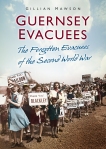
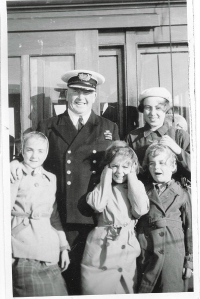
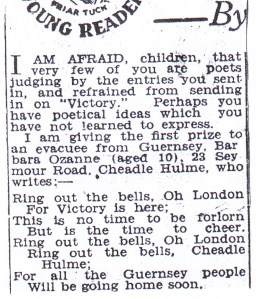
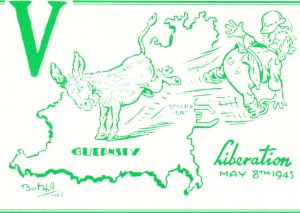
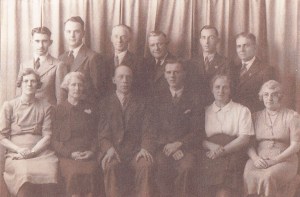
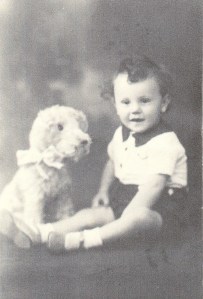
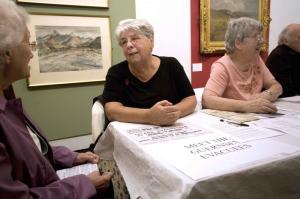
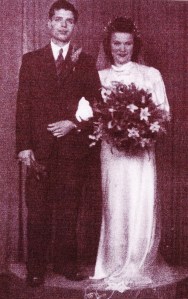
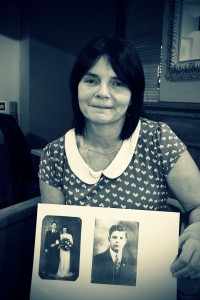
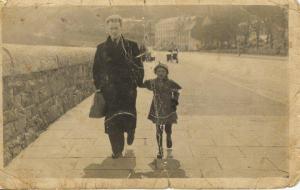
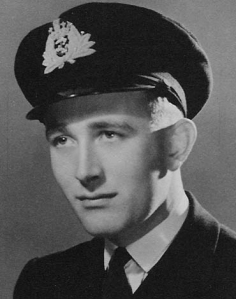
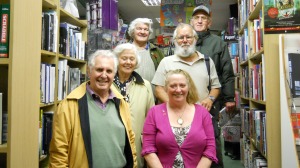
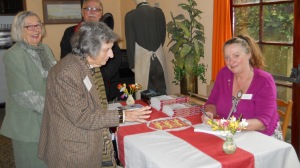
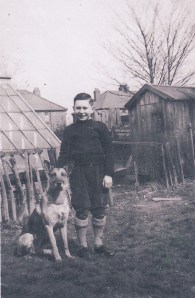
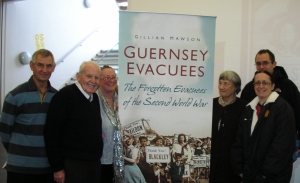
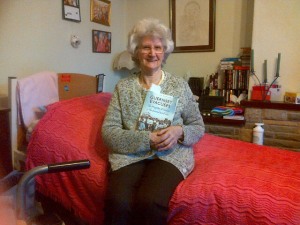
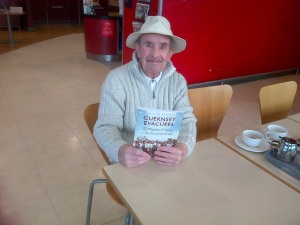
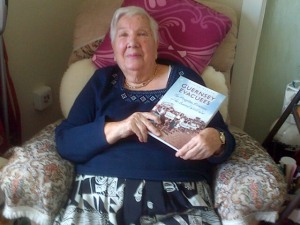
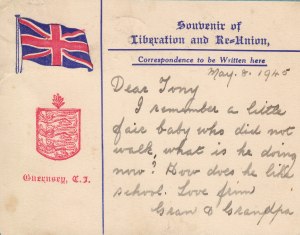
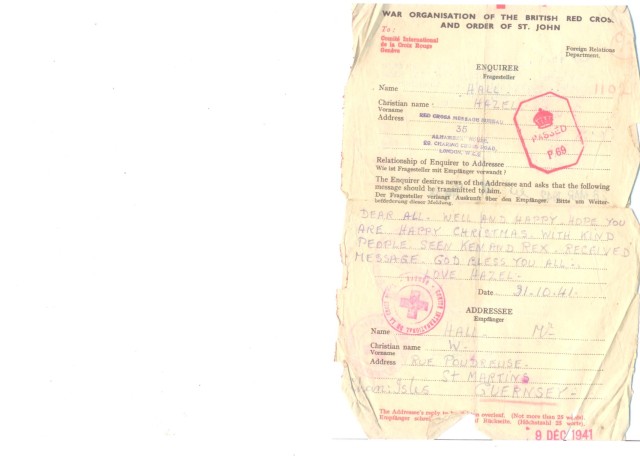
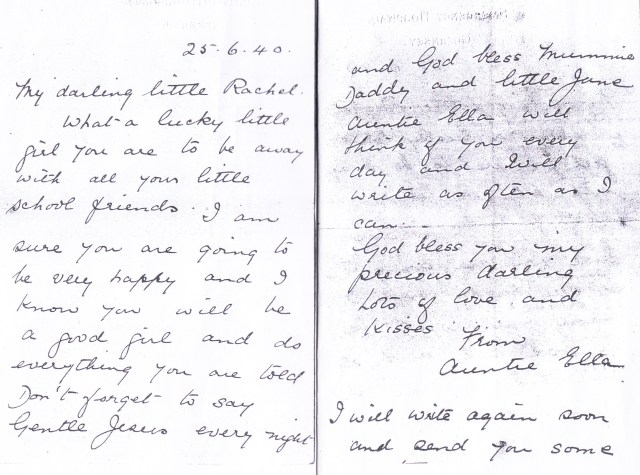
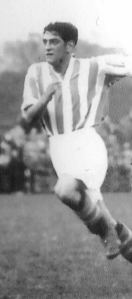
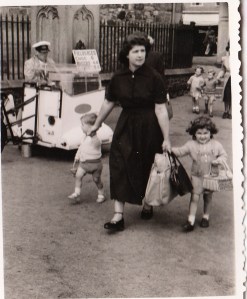
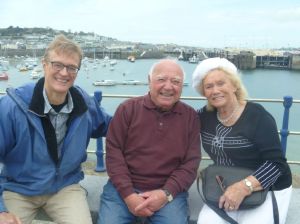
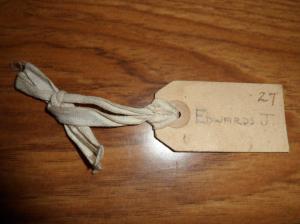

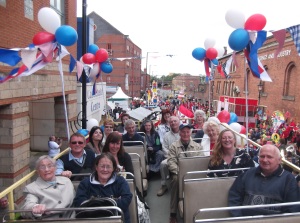
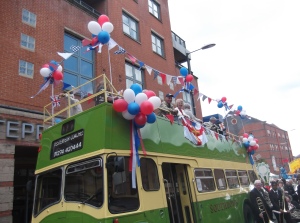
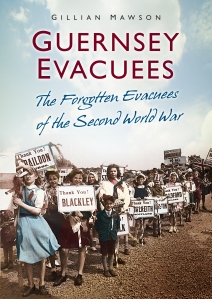
I love books based on actual journals. Great to see you are doing this.
I have no idea if you are interested in looking at my similar website. My book “Elsie – Adventures of an Arizona Schoolteacher 1913-1916” is taken directly from her journals and letters written home to California. I added my own research as footnotes and forwards to each chapter. If you want to take a look it is on Amazon both as a print and ebook. You can go to this site and read about it http://www.barbaraannewaite.com and on amazon it is:
http://www.amazon.com/Elsie-Adventuresof-Arizona-Schoolteacher-1913-1916/dp/0983945209.
Will follow your progress. I think the best advise that was given me for my wordpress website was to add a column called “Tidbits” that I update with historical photos and snipets of history not included in the book. Barbara Anne Waite
Hello Barbara thank you so much for your comment and the details of your website. I will take a look at it later, and perhaps other readers of this comment will take a look too. thanks for your advice too about the Tidbits column which I may use once the book is written. Gillian
Where did you find these Canadian newsletters? I’d love to be able to take a look at them.
Hi Elspeth I scanned one of them so could email it to you when I am back home, just send me your email address through this website, which I will keep private. I saw your blog too, very interesting, I would love to know more about your current book on Guernsey/England Gill 🙂
PS I found them in the diary of a Guernsey headmaster who brought his pupils over to england, where he ran his school for 5 years. Gill
Thanks, Gill! I’ll email you.
Incredible memoires.
Hello Christian, thanks so much for your comment. I will email you later, Gill 🙂
Fascinating and very interesting. Good luck with it and I hope to read more. Real history by real people.
My mother was a child evacuee from Guernsey and she has left me her story in writing as she is sadly no longer with us I wonder if you would like a copy of it to maybe include in your book or a future book. It would be so lovely to know that the story is out there.
Dear Avril I certainly would! I would be honoured to receive a copy. I have emailed you with my home address. Please let me know that you have received it. Gill
Hi Gill, i can email it to you and have a photo you may want to go with the story. Thank you Avril
Glad I found this blog. looks fascinating!
Thank you so much for your comment, I do appreciate it. I have just been to visit your blog too, its great. Will keep rechecking it when I get some spare time. Gill
Yesterday I visited the Odusan Unification Observatory in South Korea and could look across the water to N. Korea. I was stunned by the photos showing women who had husbands and sons kidnapped and taken to N. Korea in 1950 and they have never been able to find out what happened to them. It saddened me to think of never knowing what happened to loved ones. I observed one very old man looking through binoculars across the water into N. Korea and I wished I knew what his story was. I am looking forward to Gillian’s book that perhaps will tell the complete stories that otherwise we may not have known.
Hello Barbara, thank you so much for this very moving information and it is good to hear from you again. I hope that people will look at your blog to find out about your wonderful book which utilised wonderful personal journals and letters at: http://www.barbaraannewaite.com
Absolutely fascinating! I was introduced to this topic when I read the book The Guernsey Literary and Potato Peel Pie Society. I was happy to read your blog and learn that you have written a book with personal stories, photos, and interviews of some of the evacuees. I just preordered my copy on Amazon and will continue to follow your blog. Thank you for keeping this piece of history alive.
Thank you so much Ellen for taking the time to leave this comment on my blog and for pre ordering my book. I am grateful for all the support I get. I am glad that you will continue to follow my blog too. Gill 🙂
Hi Gill,I have looked at more of your blog its getting more and more involved isn’t it and so interesting to everyone. I am hoping that the younger generation are reading it. Gill I had a present from a friend which was a newspaper cutting of some evacuees returning home where their parents are greeting them, but I dont know where it was from. My friends bought it and framed it in connection with my book quite clever really. Which you will probably see when you read my book. Would you like me to e mail you the cutting.
Best wishes Rita.
hi Rita, thank you for your comments about my blog, I really appreciate it. I would love to have an email copy of the cutting. have I already given you my email address? Please DM me if I havent, thanks so much Gill 🙂 (cant wait to read your book too!)
Hi Gill, No I have’nt got your e mail address. I will wait to hear from you with it. then send the cutting.O.K.
will send it to you today thank you Rita !
Pingback: Would you give up your job to follow your passion? Gillian shares her experience. | Fabafterfifty.co.uk
Excellent research. Any idea when the book will be avialble for the Kindle?
Hello Jeff thank you for your comment. I do appreciate it. As soon as I have a Kindle date I will post it here and also advise you. Gill
Love to know whrn your book will be released on kindle. Yhank you Heidi
Hello Heidi, I am not sure of the date as yet, but will put a note on this blog when it is available. If you sign up to my blog you will see the announcement automatically. Go to ‘My New book Book Blog’ page and sign up there. Thanks Gill
Pingback: Guernsey Evacuees: The Forgotten Evacuees of Second World War by Gillian Mawson « historyme
Hi My Name is Susan and I have a “Castlemilk History Facebook” page, and I have a little information to go on… A photocopy of a photo was given to me about 20 years ago when we were beginning as a History group, of children (All boys) with the nursing staff, in front of the then old Mansion House called “Castlemilk House” and told that they were evacuees from Guernsey… Could you tell me if there was any truth in that? Thank you…
Hi Susan I have no idea where Castlemilk is, can you please give me a little more information so that I can try to help? Thanks, Gill
Wow Gillian, this is really impressive. I know how difficult it is to obtain all this information as we are writing about the same period albeit I’ve chosen Jersey rather than Guernsey for my story. All the best with it.
Cheers John, and I will continue to follow you on twitter! Gill 🙂
Thank you for this extraordinary and, for my generation, very interesting compilation of experiences made by Guernsey evacuees during World War II. Born in St. Peter Port in 1938 but only having spent (post war period) 12 years of my life in Guernsey, I still feel very much a “Guernsey Girl”. I now live in Switzerland as a retiree with my Swiss Husband Josef Egger – he was Manager of the Vanity Box in Highs Street from 1956 until 1958 and our exciting married life – currently up to 54 years, saw us living in Canada and 42 years Downunder,, where we became Australîan Citizens and caught up with many other C.I. expats. Congratulations and every good wish Jean-Yvonne Egger (née Collins)
Hello Jean-Yvonne and thank you for your comment, I really appreciate you taking the time to contact me. If you would like to keep updated on my Guernsey research, do sign up for my blog so that you will automatically receive updates. My best wishes to you and your family. Gill
Hi, look forward to reading your book. My mother, Pauline Johnson (nee Gibbons) was evacuated from Guernsey with her parents and sister. Her father, Frank Gibbons, was a teacher at Elizabeth College. Her late parents returned to Guernsey after the war. My mother and her sister, the late Mary made their homes in Jersey, where she still resides. Philip Johnson
Hello Philip thank you for your comment and the information about your family. I hope you have managed to obtain a copy of my book and I would love to hear from you when you have read it. Gill
HI Philip, I forgot to give you the link to the piece I wrote when I met a group of Elizabeth College boys who came to Derbyshire for a reunion in late 2010 – here it is http://www.oea.org.gg/node/6157
Pingback: Child Evacuees of the Second World War « The History Vault
Pingback: How Guernsey Evacuees Changed My Life - Women Writers, Women Books
Hi Gill, Well ! I thought it was about time to leave a comment on your blog for a change. What a fantastic story your book portrays. As an evacuee myself I am very proud of the hard work you have done in bringing so many Guernsey evacuees together enabling them to share their life stories. Its so heart warming to see the pictures of them looking so happy . I congratulate you and wish you every success. HAPPY NEW YEAR.
Rita, thank you so much for your constant support of my blog and I am so pleased that your own evacuation story will be included in my new book of 100 British evacuation stories. Gill 🙂
Thank-you for the research which you have done. I have only begun to read the blog and the comments. I am doing research for my friend, Betty, who was an evacuee from Glasgow to Dalmore and Knipoch House in the Oban area during WW 2.
Betty would be so delighted to connect with anyone who was evacuated from Glasgow to the above mentioned area.
I am a Scot who has resided in Canada for many years and I was born during WW 2, but I moved at a very young age to the Highlands of Scotland.
If you assist me with how I can do further research for her I would be most grateful.
Flora M. Forbes
Hello Flora,good luck with your research and I hope that someone reads this post and can help you. I normally send a letter or email to the newspaper in the evacuation area, to see if readers can help. You may have already done this, but if not, you can contact the Oban newspaper here:
http://www.obantimes.co.uk/#
and the Glasgow Daily Record ewspaper here:
http://www.dailyrecord.co.uk/contact-us/
The very best of luck and I would love to hear the story when you have found out more. Gill 🙂